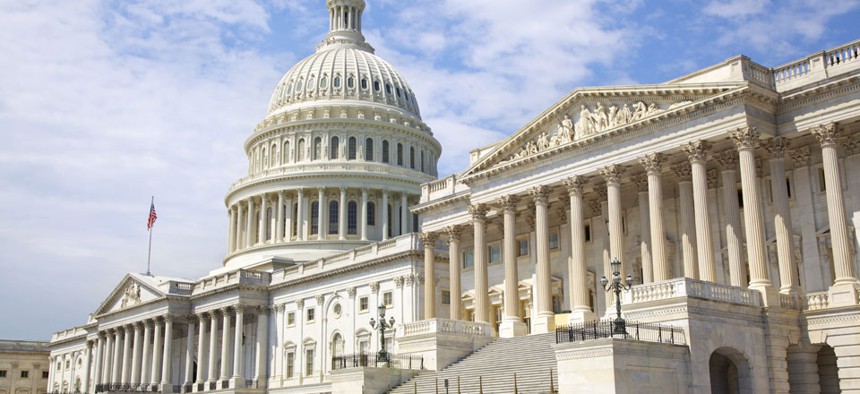
“What I wanted to do was a benign bill, a bill that would fund the government adequately, that would not have any earth-shaking changes. And I think that’s what we have,” Rep. Hal Rogers, R-Ky., said. Vlad G/Shutterstock.com
Congressional Negotiators Reach Deal on Omnibus Spending Plan
Legislation includes all 12 appropriations bills and funds the government through the end of September,
It is 1,582 pages of give and take—some might even dare to call it compromise—that provides at least a nine-month truce in the fierce fighting over the federal budget that has torn Congress asunder for years.
Like the budget agreement that preceded it, the omnibus spending bill for the remainder of fiscal 2014 unveiled Monday night by congressional appropriators represents a small deal that provides few changes and no major overhauls to key programs targeted by each party.
The legislation, which includes all 12 of the usual appropriations bills and will fund the government through the end of September, is expected to pass Congress this week, giving lawmakers little time to dig through the massive document.
House Appropriations Committee Chairman Harold Rogers described it Monday as a status-quo funding bill, one that prevents another government shutdown while giving Republicans time to regroup and focus on their priorities in the appropriations process for the next fiscal year.
“What I wanted to do was a benign bill, a bill that would fund the government adequately, that would not have any earth-shaking changes. And I think that’s what we have,” Rogers said.
Despite Republican pressures during the negotiations, the final omnibus legislation does not make sweeping changes to the Affordable Care Act. Though Republicans did not get the cuts they wanted, neither did Democrats get funding increases.
“There’s nothing in the bill that knocks Obamacare,” said Senate Appropriations Committee Chairwoman Barbara Mikulski. “Obamacare lives another day.”
Still, Republicans on Monday called the deal a victory, noting that it maintains status-quo spending levels for the Affordable Care Act; it eliminates $10 billion in funding for the Independent Payment Advisory Board, set up in the new law to make binding recommendations to Congress for reducing Medicare costs beginning in fiscal 2015; and it does not include $700 million in funds for a pre-kindergarten education initiative championed by President Obama.
Overall, the measure cuts funding for the departments of Defense, Homeland Security, Transportation, and Housing and Urban Development; the legislative branch; and the State Department and foreign operations, putting their total budgets below the levels enacted in fiscal 2013 spending allocations. Of those, Defense was hardest hit, losing $32.8 billion from the prior fiscal year.
All other departments saw modest increases from fiscal 2013 to fiscal 2014.
And while the omnibus makes a reduction in funding for the legislative branch overall (from $4.28 billion to $4.26 billion), it actually increases the allocation for the House from the previous fiscal year, while keeping level funding for the Capitol Police, which responded to a car chase near the Capitol that ended in a fatal shooting last year.
Rogers said he anticipates that conservatives will support the measure, given its cuts in discretionary spending. “The overall discretionary number is lower than it was when Obama took office,” he said. “So we’ve cut the discretionary side of the budget now for four years running, which is historic. It has not been done since the Korean War.”
House Majority Whip Kevin McCarthy echoed that sentiment. “It’s $29 billion less than what we even had in the Path to Prosperity,” he said.
In a rare bipartisan victory, the bill also reverses controversial pension cuts for disabled veterans and provides a fix for cuts to survivors’ benefits, leaving pension changes for other retired veterans to a larger overhaul that the Senate Armed Services Committee and others will take up later this year. Rogers said Monday that he was confident those changes would inspire even some of his most skeptical colleagues to support the overall omnibus. “I think a lot of members will focus on that,” he said.
Rogers added that he is hopeful that the omnibus will garner the overwhelming support of his colleagues on both sides of the aisle, much as the budget deal did in December. A vote on the omnibus is expected in the House on Wednesday, with a cloture vote in the Senate likely on Friday. Final passage could come as late as Saturday evening.
“We hope it will get a strong vote,” Mikulski said. “The fact is that this is a strong, bipartisan bill and it is a bicameral bill.”
The House is expected to vote Tuesday on a continuing resolution to give Congress the time it needs for final passage of the omnibus. Under current law, the funding mechanism keeping the government’s doors open will expire Wednesday at midnight. The CR, which is expected to pass both chambers, will move that deadline back to Saturday at midnight, giving the Senate time to pass the omnibus.
Sen. Jeff Sessions of Alabama, the top Republican on the Budget Committee, who opposed the Murray-Ryan budget in December, was skeptical of the omnibus, but he suggested Senate Republicans wouldn’t derail the measure now.
“We’re not going to stop the process mid-year,” he said.
While Sessions believes the bill’s passage all but forecloses the possibility of another shutdown—“that seemed to settle that,” he said—he had reservations about the appropriations process, specifically what he cast as the decline of regular order.
Since the legislation includes all 12 funding bills, Congress will not have to pass any more continuing resolutions for government agencies or departments this year.
The bill sets funding for government agencies through the remainder of fiscal 2014, which ends Sept. 30, at $1.012 trillion. Each federal agency will now have to subtract its spending since Oct. 1 from its top-line spending level before allocating the remaining resources.
The omnibus legislation is the result of a month’s negotiations between Rogers, Mikulski, and their subcommittee chairs, far less time than is typical for development of a spending bill of this kind. Conservative groups are already railing against appropriators for rushing the bill through, but Rogers and Mikulski said Monday that they were pleased with what they were able to accomplish in such a short time frame.
“Senator Mikulski was a great partner to work with,” Rogers said. “We had long, laborious negotiations, of course. But I am pleased with the result.”
The two were still engaged in a tug-of-war as late as Sunday evening, Mikulski added. “We worked last night up until about 7 o’clock. You know, we were done before Downton Abbey,” she said.
Billy House and Michael Catalini contributed to this report.
(Image via Vlad G/Shutterstock.com)







